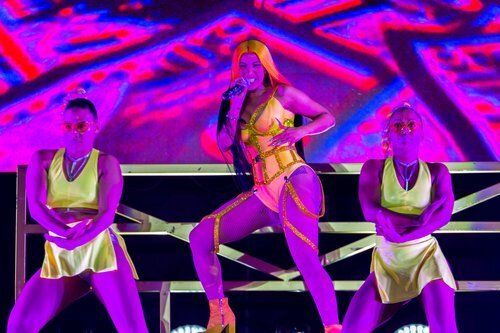THE LEORA LETTER
Boys will be boys…and girls will be sluts.
October 19, 2021

“Slut,” “hoe,” and “thot” are slippery and subjective terms
that can apply to any girl or woman, regardless of how they dress or behave. I shed light on slut-shaming—how and why assumptions about being “too” sexual are applied, the consequences for women, and the impact on everyone, regardless of gender.
From Object to Subject: Q&A with Dr. Melissa Brown, PhD
All girls and women are at risk of being slut-shamed, regardless of their actual sexual behavior, which may be nonexistent. But Black girls and women are at extraordinary risk. More than anyone else, they are presumed to be hypersexual. Because of misogynoir, the term coined by Moya Bailey for the intersection of racism and misogyny, Black girls and women must be on guard at all times so as not to reinforce false and harmful narratives.
I reached out to Dr. Melissa Brown, a scholar of Black feminist thought at Santa Clara University, who produces the fascinating, important, and addictive website Blackfeminisms.com, to share her insights on the marginalization of Black women through slut-shaming.
Leora Tanenbaum: What is the focus of your research?
Dr. Melissa Brown, PhD: My research centers on how Black women and LGBTQ people across the African diaspora use digital technology and innovate digital practices, particularly in the realms of activism and sex work.
Tanenbaum: We know that Black women often are treated as if they are always sexually available. For Black women who labor as exotic dancers and in the sex work industry, how does this presumption that they are inherently hoes/sluts influence their working experiences? For example, are they more likely to engage in risky behaviors? How does this presumption impact their mental health?
Brown: Yes, Black women are subject to what sociologist Patricia Hill Collins calls controlling images. Of these controlling images, the Jezebel, which emerged during the colonial era, justified the sexual exploitation of Black women on the belief that women of African descent were hypersexual and impure relative to white European women.
In contemporary society, the Jezebel reemerges in the trope of the “hip hop hoe,” which associates the sexuality of Black women with imagery in rap music media that profits off the labor of Black women sex workers in particular. These characterizations are intimately related to other contemporary characterizations of Black women such as the gold digger, which devalues the erotic labor of Black women as sociologist Siobhan Brooks found in her study of race and racism in the early twenty-first-century strip club industry. Likewise, historian Mireille Miller-Young found these controlling images adversely affected Black women in the pornography industry. Ultimately, Black women sex workers are presumed to be less desirable and therefore are often given less value for their erotic labor, particularly if they do not fit certain eurocentric standards of beauty.
While there isn’t currently evidence that Black women sex workers are actually more likely to engage in risky behaviors, prior research does indicate that clients expect Black women to engage in more risky behaviors, which endangers them. As a result, sociologist Stephanie Tatum argues that the ways Black women are devalued and mistreated as sex workers, particularly in prostitution, does have an adverse effect on their health.

Singer Cardi B and dance crew at a private performance during the Super Bowl on February 1, 2020. Photo credit: YES Market Media / Shutterstock.com.
Tanenbaum: Is it possible for Black women exotic dancers and sex workers to create a financially and emotionally sustainable career, or is the hypersexualization of Black women an insurmountable obstacle to fair pay and safe and healthy working conditions?
Brown: Overall, the obstacles to fair pay and safe and healthy working conditions they experience are due to the ways sexual commerce is dominated by White men and, to a lesser extent, men of color, as business owners who gate-keep those who can perform and profit in their venues.
While the hypersexualization of Black women hinders their success as sex workers to a significant extent, research shows that Black women sex workers are aware of how clients and business owners in the sex industry perceive them and, at times, use this to their advantage. For example, Black women exotic dancers are expected to conform to an aesthetic most often visible within rap music productions such as music videos. They are expected to have a curvaceous figure and perform certain types of movements, particularly twerking.
In my research, I identified that several Black women exotic dancers, particularly based in the urban South, have used these aesthetic expectations to initiate their own entrepreneurial ventures related to cosmetics and fashion. In a sense, the expectation that they look a certain way makes them the expert in this self-presentation. They can then capitalize off their expertise by creating and selling things like hair extensions, eyelash extensions, or outfits similar to those worn by exotic dancers.
Tanenbaum: What conclusions do you draw from your research that can be applied to Black women in general?
Brown: A key aspect of my research is identifying how the self-presentation of Black women exotic dancers contrasts with their presentation in popular media or in the strip club industry. I observed that Black women exotic dancers use Instagram in particular to present a holistic version of themselves. For example, while the strip club requires women to have a hypersexual self-presentation, on Instagram, many of these women present themselves in a flirty, sensual way by using their own homes essentially as photography studios. In the domestic space, they then present more like a “girl next door” rather than a “video vixen.”
I think the ability to present a more nuanced sense of self through social media facilitates for all Black women two key aspects of Black feminism—self-definition and self-valuation. Through self-definition, Black women use their lived experiences to name the meaning of Black womanhood for themselves, creating a diversity of perspectives rather than the restrictive and dysfunctional characterizations of Black womanhood normalized in mainstream discourses about Black women. Through self-valuation, Black women determine for themselves their sense of worth, once again rooting that sense of worthiness in their community’s own values rather than those of broader society. However, this does not mean that all Black women agree or that all Black women are feminists.
Tanenbaum: Regarding women who are not exotic dancers or sex workers, when White women position themselves on social media as "owning" their sexuality—for example, by posting photos of themselves in bikinis—there is always a risk of being slut-shamed, but at the same time, there is also always a chance they may be rewarded with "likes" or even corporate endorsements. (Sometimes, both results occur.) What tends to occur, though, when women of color, particularly Black women, do the same thing?
Brown: Black women who use social media to publicly display their sexuality also face slut-shaming. However, controlling images of Black femininity mean that there are specific discourses about sexuality that Black women face due to misogynoir, a term coined by Moya Bailey to describe the ways racism and sexism function together to marginalize Black women in unique ways.
For example, scholar Kyra Gaunt finds that twerking is rooted in west African cultural practices around dance, movement, and embodiment. Often, however, when Black women and girls use YouTube or other social media to display these cultural practices, other social media users, particularly through the comments function of many social media sites, respond to these videos by implying that these Black women and girls are “hoes” and “fast” and shame them. However, Gaunt and other Black feminist scholars find that twerking is perceived differently when White women like Miley Cyrus do it. Then, the practice gets normalized and treated as a type of fitness or self-expression, completely divorced from its context as both an African and Black women’s cultural practice. White women can then capitalize off these practices in a way that Black women cannot.
I observed in my research that on Instagram, posts made under the hashtag “twerk” or “twerking” tend to only show videos that portray White women. When Black women engage in twerking, they don’t receive as many likes or views, and sometimes have their videos removed for “inappropriate” content.

Tanenbaum: Has anything in your research surprised you?
Brown: So far, the surprising aspect of my research was in the gender and racial differences in how other Instagram users interact with Black women exotic dancers online. Users who commented on or liked the posts of these dancers were mostly other Black Americans. Black women tended to compliment the dancer in terms of her beauty, while Black men tended to react to the dancer in terms of her sexiness.
I actually think the gendered beautiful-sexy dichotomy tends to emerge in various ways throughout society. While women, in general, are encouraged to embrace their beauty, they are simultaneously encouraged to downplay their sexiness. But what my research shows is this perception is in the eyes of the beholder. Our society conditions men and women to perceive and therefore objectify women differently. Furthermore, these perceptions assume heterosexuality and binary gender.
Tanenbaum: What is the relationship between popular culture and representations of Black women’s sexuality? How does this relate to the ways they are slut-shamed? How do Black women respond to these popular culture tropes?
Brown: For the better part of the twenty-first century, most representations of Black women as sexual beings have been in music videos or song lyrics of Black men rappers based in the United States. Research by Margaret Hunter and Kathleen Soto found that these songs have two opposing yet interrelated tropes about women that reflect a madonna-whore dichotomy. On the one hand, women are “video hoes” whom men can exploit for sex and status, but treat as disposable and shame them for the sex acts they participate in. On the other hand, women are “loyal girlfriends,” who stand beside their men despite their shortcomings, which include dalliances with “video hoes,” and never stray sexually, acting almost like virginal wives.
While these discourses are the ones most embraced by consumers, as Billboard and YouTube numbers reflect, they do not occur in a vacuum. Since the dawn of rap music, Black women have created their own sound and used rap music to express their sexuality on their own terms. While some might say today’s artists like the City Girl, Cardi B, and Megan Thee Stallion, reinforce these tropes, I would argue that their music does the work of shifting Black women from a sexual object to a sexual subject. By centering themselves and other Black women in their songs and music videos, Black women rappers open up avenues to push back against slut-shaming and instead emphasize pleasure, joy, and mutual respect.
Key takeaway: Research on the objectification faced by Black women sex workers sheds light on the fact that all Black women live in a culture of racialized slut-shaming and misogynoir. Social media and pop culture provide opportunities for Black women to define and value themselves and to push audiences to regard them as sexual subjects, not sexual objects.
Share Your Story
Have you been sexualized against your will? How did this experience make you feel, and did you push back—or not? Email me at leora@leoratanenbaum.com and let me know if I may quote you—anonymously—in a future issue of this newsletter.